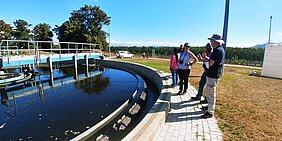In the KreATiw project, experiences from South Africa are used to successfully adapt existing risk management approaches for drinking water supply and wastewater disposal to climate change. In South Africa, water scarcity is already a severe problem, which is why a lot of experience has already been gained in dealing with drought. The exchange of experience and the cooperation with local partners is therefore one of the remarkable points of this project. By now, the KreATiw team has carried out the initial phase of the project.
Climate Change will have severe consequences for sanitation and water safety in many regions of the world. With this project we will make an important contribution to the adaptation of risk management in these secors to the consequences of climate change. Therefore, experiences in the application of holistic Climate Resilient Water and Sanitation Safety Plans (CR-WSSP) from South Africa will be used to further develop and test a methodology to adapt existing risk management approaches to the consequences of climate change. The results obtained in this project can be transferred to other regions of the world, as well. For instance, the experiences made in South Africa can serve as an information basis for the German water sector. Furthermore, the results obtained in this project will serve stakeholders in the future implementation of regulatory frameworks for water reuse.
Work plan
The initial phase oft he project served to create the basis for CR-WSSP and thus support sustainable resource management. Therefore, pilot areas and stakeholders have been identified and information on climate and other regional factors influencing the water sector in the designated pilot areas was collected. Moreover, the broad application of the CR-WSSP resulting from our work in Southern Africa was enabled, and a concept for the project’s main phase has been developed. The project partners have worked in close cooperation with each other during all phases and in all work packages of the project.
The work packages (WP) described below have been conducted under the leadership of the German Water Centre TZW:
WP 1 dealt with data collection and situation analysis. The local demand for activities and research in the field of CR-WSSP has been identified and the current status of water supply and wastewater disposal has been recorded.
In WP3, stakeholders have been contacted and potential pilot areas have been identified. In addition, solutions were discussed at a stakeholder workshop and integrated into the concept for the main phase. The workshop also address further potential partners for the main phase (e.g. University Stellenbosch, AUDA-NEPAD, WRC, IWA), where stakeholders will be actively involved in the implementation and dissemination of the new water risk management approaches.
WP 4 has been used for continuous cooperation and knowledge transfer with network partners from the university/academic environment (e.g. AUDA-NEPAD). Training approaches for capacity building during the main phase have been developed (e.g. conducting master classes or exchange programs for master students). In addition, this WP included the publication of the results of the initial phase as well as participation and presentations at regional and international conferences.
The project was coordinated by the German Environment Agency (UBA).

![[Translate to English:] Prüfstelle-Produktprüfung_Teststand Test centre and product testing](/fileadmin/_processed_/0/9/csm_TZW-Karlsruhe_Pruefung_Geraete-Teststand_377188946c.jpg)
























![[Translate to English:] [Translate to English:]](/fileadmin/_processed_/d/d/csm_KreATiw_20220308_141145_2b8f5af5e4.jpg)

